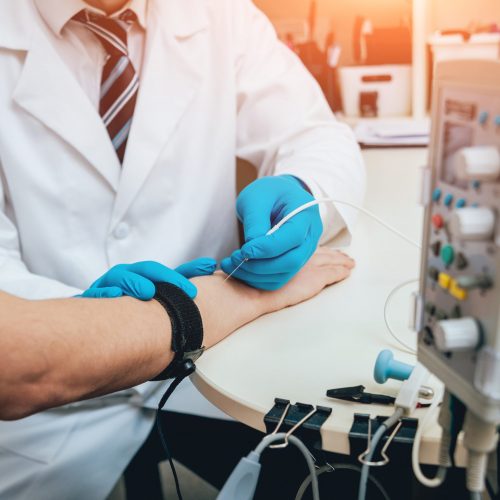About Our Neuromuscular Program:
Neuromuscular disorders impact the nerves that control voluntary muscles and the nerves that communicate sensory information back to the brain. Neuromuscular diseases involve a wide-ranging group of disorders that impact an estimated 250,000 patients in United States.
Understanding the cause of your symptoms is the first step in the determining what treatment may be the best for your situation. Our team of experts diagnose and treat neuromuscular diseases such as Demyelinating Diseases, Hemifacial Spasm, Myasthenia Gravis, Myopathies, Myositis, Neuropathies and more. Many of these conditions are treatable when properly diagnosed.
NCD houses a state-of-the-art diagnostic imaging and neurological testing. We are pleased to assist primary care physicians and general neurologists, whether that means serving primarily in a consultative capacity, or managing the treatment of the patient. Each person with a neuromuscular disorder has their own unique journey and we work as partners who walk this journey with our patients and their family.

Our Neuromuscular Disorders Team:
While all our neurologists provide diagnosis and treatment for Neuromuscular Diseases, they rely on our neuromuscular team to complete the necessary testing, Electromyography (EMG)/Nerve Conductive Studies (NCS), on the individual for diagnosing.
Neuromuscular diseases (NMD) involve a wide-ranging group of disorders that impact an estimated 250,000 patients in United States. Neuromuscular disorders affect the nerves that control voluntary muscles and the nerves that communicate sensory information back to the brain. Nerve cells (neurons) send and receive electrical messages to and from the body to help control voluntary muscles. When the neurons become unhealthy or die, communication between the nervous system and muscles breaks down. As a result, muscles weaken and waste away (atrophy).
Some symptoms common to neuromuscular disorders include:
- Muscle weakness that causes twitching, pain, cramping
- Muscle loss
- Movement issues: gait disorders, uncoordinated movements
- Balance problems
- Numbness, tingling or painful sensations
- Droopy eyelids
- Double vision
- Trouble swallowing
- Trouble breathing
There are many types of neuromuscular disorders. The commonly treated disorders in our clinic are as follows:
Types of neuromuscular disorders include (but are not limited to):
- Amyotrophic lateral sclerosis (ALS)
- Multiple sclerosis
- Muscular dystrophy
- Myasthenia gravis
- Myopathy
- Myositis, including polymyositis and dermatomyositis
- Peripheral neuropathy
- Spinal muscular atrophy
- Diabetic Neuropathy
Our specialists spend adequate time discussing the patient’s medical and family history, as well as completing muscle weakness and reflex exams. Once the physician concludes the information part of the examination, they may order additional diagnostic and laboratory testing. These may include the following:
- Blood test to check for elevated enzymes
- Magnetic resonance imaging (MRI) scan of the brain and spinal cord
- Lumbar puncture (spinal tap) to check cerebrospinal fluid
- Electromyography (EMG) to record the electrical activity of each muscle
- Nerve conduction studies to see how well signals travel from nerve to muscle
- Muscle biopsy to examine a sample of muscle tissue under a microscope
- Genetic testing to confirm gene mutations
Due to the number of neuromuscular disorders and their varying symptoms, there are many different options for treatment. Our team of specialists create patient centered treatment plans tailored to the individual’s specific needs. Once the neurological disorder is identified, a plan is put in place that may or may not include:
- Medication Management
- Physical, Occupational & Speech Therapies
- Infusion Therapy: Intravenous immunoglobulin (IVIg)
- Surgical options when needed
There are many different causes for neuromuscular disorders, many that are not even known currently. Here is a list of known causes:
- Genetic mutation
- Viral infection
- Autoimmune disorder
- Hormonal disorder
- Metabolic disorder
- Dietary deficiency
- Certain drugs and poisons
- Unknown factors
- A professional collaboration to improve the patient’s quality of life
- Consultation with a fellowship-trained neurologist
- In-house EMG/NCS testing
- Medication review and management
- Onsite physical, occupational and speech therapies focused on neurological disorders
- State of the art technology including MRI (with neuro trained radiology readings)
- Clinical Research providing access to emerging therapies
- Surgical consultations and referrals to local neurosurgeons when necessary
Contact Us
We’re here to answer any questions in order to make your appointment easier.
Find a Specialist
Learn more about our fellowship-trained specialists!
NCD Testing Center
Learn more about the testing available for seizures in our Neuro Testing Center.

